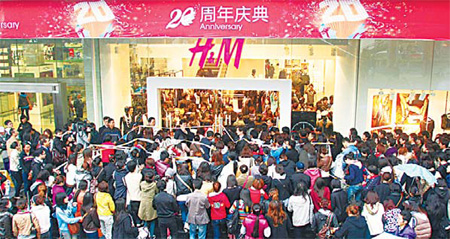|
|

People crowd outside a newly opened H&M outlet in Hangzhou recently. H&M has opened 13 new stores this year, taking its total number of outlets in China to 27. Yu Yimin
|
European fashion retailers are accelerating business expansion in China thanks to the nation's increasing number of fashion-conscious consumers.
Two companies that opened new outlets in China at a rapid pace this year included Sweden's H&M and Spain's Zara, both retailers of clothing and accessories for adults and youth.
H&M is ending this year with a total of 13 new stores, raising the company portfolio in China to 27 outlets, while Zara, opened 33 new stores in China, winding down the year with 60 in total.
"In China, new store openings have more than doubled due to strong domestic consumption, which has not been affected by the global financial downturn," said Wu Shuang, public relations manager of H&M China. Globally, H&M store openings are up between 10 percent and 15 percent in 2009, said Wu.
"More H&M stores will be set up in China next year, especially in the second-tier cities," he said.
H&M, Europe's second largest fast-fashion retailer, entered the Hong Kong and Shanghai markets in 2007 and later expanded its business to second-tier cities like Hangzhou and Ningbo of Zhejiang province.
Back in August, H&M sales in Spain, the US and France were down 11 percent over July sales, the fourth consecutive monthly drop.
In 2008, average sales revenue at H&M stores in the Chinese mainland and Hong Kong was up 23 percent to 59 million yuan, while globally average store sales was 48 million yuan.
"We are expecting favorable sales volume in China this year," said Wu, while declining to elaborate further.
Strong sales numbers were also recorded at Zara, the leading fast-fashion retailer in Europe. "The Chinese market is attractive with its soaring consumer spending power," a Zara promotion executive said on condition of anonymity. Chinese consumers can expect to see more Zara 'fast fashion' stores in the future," he said.
Fast fashion is a term used to describe fashion trends that are manufactured quickly in smaller batches to keep inventories down and allow mainstream consumers to take advantage of current clothing styles at lower prices. This type of quick manufacturing methodology is preferred by large retailers like H&M, Forever 21 and Zara, according to online apparel industry directory, Apparel Search.
This access to the latest clothing styles is popular with white-collar consumers in China.
"I have been waiting for 30 minutes to try on several pieces of clothing, but the wait doesn't matter. I love to get everything here, and the prices are acceptable," said Liu Dan, a woman in her 20s shopping at one of Zara's Beijing stores. Liu, who works in the public relations department at an international company, said she is also a regular patron of H&M in Beijing. Both H&M and Zara stores are often crowded with local consumers, especially on the weekends.
(China Daily 12/26/2009 page10)
|


